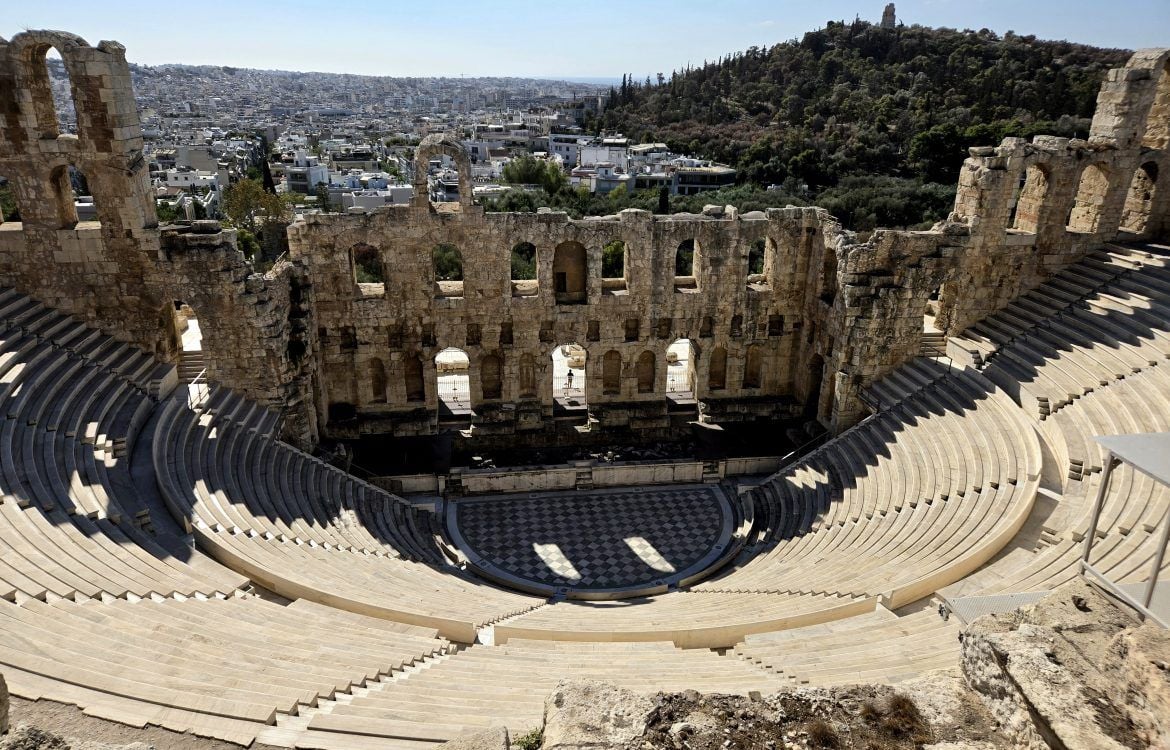
From Michigan to the Odeon: How Seeing Greek Theatre Live Changed My Perspective
[Article by CYA Fall ’24 student and CYA MediaLab intern Max Wright]
When I was first thinking about coming to Athens, something that drew me here was the theatre. To preface, I’m a classics and theatre major from Michigan and I’ve always had a love for the works of the Ancient Greeks. I love the way they represent humanity and people, telling us bits and pieces of how both the wealthy and lower class lived in Classical Athens, and giving us insight into their humor and emotions. Theatre to me is one of the best ways to connect with others as it’s such a uniquely human experience built out of our oral storytelling traditions, so the fact that I would be able to come to Athens and see the theatres where these productions were first put on in person was an opportunity I could not pass up. However, what I didn’t expect was the fact that I would get to see some of these plays actually performed in these locations as well.
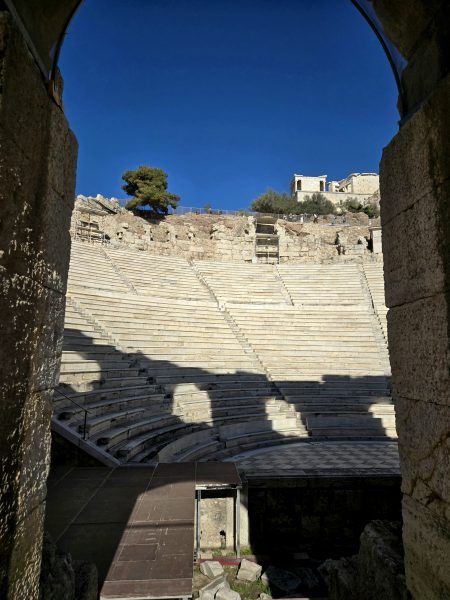
This semester I’ve been very lucky to take one of the theatre classes offered here at CYA called “Greek Theatre: Ancient and Modern” taught by Nina Papathanasopoulou. This course has taken me to see a variety of shows here in Athens, and I know some of the other classes have gone to see performances as well. Theatre here seems to be a super unique culture, having festivals just to perform classical plays and to keep that tradition alive, and I feel so lucky to witness even a portion of it. My favorite show I’ve gotten to see so far has got to be a version of Aristophanes Birds put on the ancient Odeon of Herodes Atticus on the side of the Acropolis itself! Seeing this live, performed in Greek (modern, not ancient), in such an incredible venue amplified the experience into something that I’ll remember forever.
I also asked some of my classmates their thoughts about going to see these shows in locations like this, specifically if they elevated the experience at all, wondering if they had similar experiences to me.
“I think seeing these shows in historical venues brings a whole different element to the experience. It makes every performance feel a lot more special and it’s really fun to see these venues that I otherwise may not have gone to.” -Soussanna Kimbouris
“Absolutely. The experience of watching theater at the Odeon of Herodes Atticus is automatically elevated by the venue. Being there I can put myself in the shoes of an Ancient Greek person and imagine what it was like for them to see plays performed there. Plus it’s just such a beautiful theater.” -Sally Eggleston
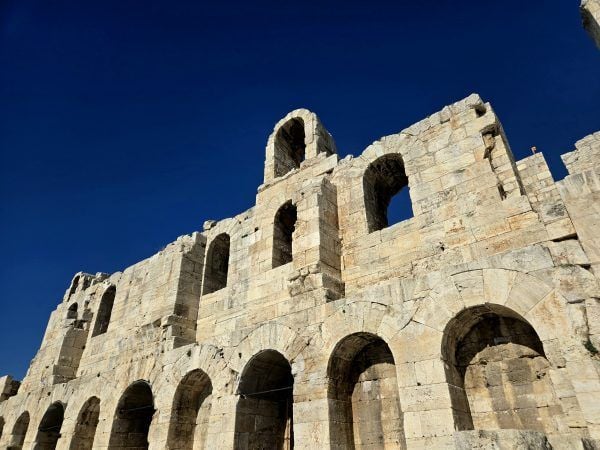
Something else that really stood out to me about these productions was the way they allowed me to connect with modern Greece. Living here in Athens you’re obviously surrounded by the culture, but as someone who doesn’t speak Greek, I can sometimes find it difficult to actually get a read on what life is like and what people might resonate with. However, being in these places, surrounded by both Greeks and foreigners, my classmates and strangers, all watching these performances and all taking in the same story, I felt so connected to everyone around me.
That really is the beauty of theatre to me, but I figured I should also ask some of my classmates what their thoughts were on the matter, specifically what stood out to them.
“My favorite part of seeing theater here, specifically ancient Greek plays, is that both of the productions I’ve seen have been set in a modern yet timeless context, rather than doing them in a classical setting (which I feel can be more common in the states?) so there hasn’t been super strict adherence to props, etc, and there’s a lot of extratextual stuff filling what might otherwise seem like a fast-moving play” -Finn Thornton
“First, as a student taking modern Greek, I love how immersed in the language I feel when watching theater here. Of course, the plays are in Greek with English subtitles, but I love moments where I can pick out words that I recognize. Also, I like seeing how modern Greek directors focus on specific themes of the classical plays, and what that says about topics concerning modern Greek society.” -Sally Eggleston
“Seeing classical plays offers an interesting insight into how they are still valued by modern Greeks, even outside of an academic setting. It has been endlessly interesting going to Ancient plays and seeing the number of Greek families seeing them as part of a casual outing” -Matthew Connolly
Overall, it seemed like the consensus was that it was really interesting to see how a different culture perceives and interprets these plays that we’ve all been studying, especially for those of us who have gotten to see productions back in the States. They will focus on elements of the plays that we wouldn’t focus on in America because it’s an entirely different landscape, so being able to witness that allows us to connect with the city we’re living in just that much more.
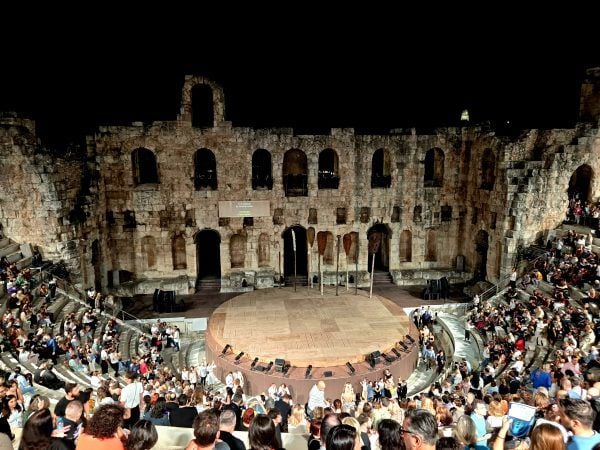
I also thought it would be interesting to reach out to my professor with some of these questions to see what she was thinking about when she planned out these trips. I’ve been able to learn so much from her this semester, and the way she analyses specific elements both from the texts and from the performances has been invaluable to my understanding, so I hoped that her responses could do that as well.
I started by asking her what she felt the primary benefit of watching these shows live could be.
“From their inception, theatrical plays were considered spectacles and were meant to be seen. The Greek noun theatron (θέᾱτρον) comes from the Greek verb theaomai (θεάομαι) which means “to watch, to gaze at” so theatre was an experience that was directed primarily to one’s sight. The purpose of theater was multifold but one of its main effects seems to have been to elicit an intense emotional experience in the audience. The plays’ characters were often found in impossible situations, faced with much suffering. Witnessing this suffering onstage, spectators would feel pity, sorrow, and fear for the plays’ characters and would be asked implicitly to judge the characters’ actions and behavior and to search for their own answers to the dilemmas presented onstage. Reading a play at one’s home or in a classroom, without the visual and performative aspects and with the inevitability of countless distractions, it is difficult for students to feel a direct connection to the characters and to engage in the emotional experience that was considered so valuable for the ancient Greeks. Live performances stimulate the students’ emotions and can offer an experience that’s closer to that of the ancient Greeks.” -Nina Papathanasopoulou
I then asked her what she thought about the venues and how that could elevate the experience for us.
“I think watching a play in an open-air amphitheater is crucial for the experience, as plays were performed outdoors, in theaters that were part of religious sanctuaries dedicated to Dionysus or the healing god Asclepius. It is hard to experience a play today and understand what it meant for it to be part of a religious ritual. Keeping this in mind, having students watch plays in the ancient Roman Odeon of Herodes Atticus elicits a sense of respect to them. The ancient theater, I think, predisposes students to watch the play with a more open, receptive, and even respectful mind, and that is partly what happened when ancient audiences were watching plays in the context of religious festivals. So yes I think seeing plays in such historical sites elevates the experience for the students. And here let me add that the Roman Odeon had a roof on top of it, so it was not an open-air theater in antiquity. It does however offer an open-air experience to audiences today with the ancient ruins predominantly visible on all sides, eliciting that sense of respect to the viewer” -Nina Papathanasopoulou
In the end, it looked like my assumption was correct, hearing her talk about this has made me appreciate this opportunity so much more. Theatre is meant to be seen, it’s meant to be experienced, one of the initial purposes of theatre back in Ancient Greece was likely as a healing and cathartic experience, and I can’t help but view it as such now.
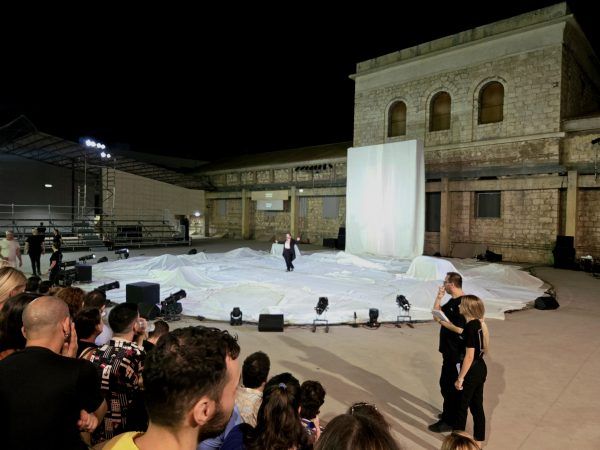
Overall, I cannot downplay the value of seeing these productions performed live in these locations. This class has been one of the best experiences I’ve had in Athens and seeing these performances has just enhanced the time I’ve spent here. Call me a theatre kid, but it’s what I love, and witnessing something I feel I know so intimately in a completely different way has reignited so much of my passion and drive for this field.
The academic value also cannot be ignored, seeing a play be performed gives you an entirely different perception of a show than simply reading the text and has helped improve my understanding of these plays immensely. I feel more connected to these scripts and I have a much deeper appreciation for the works and skill of the Ancient Greeks than I did before my time here. I’ve learned so much in Athens from all of my classes, but I cannot wait to bring what I’ve gained from this class back to my own theater in Michigan and wherever I go from there. For this reason alone (along with many many others) I can say I am so glad I came to Greece.






